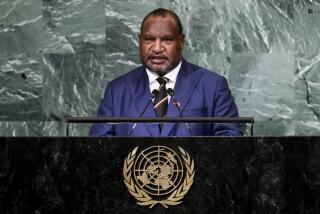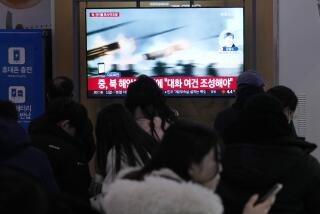6 soldiers killed in Thailand-Cambodia border clash
- Share via
Reporting from Bangkok, Thailand — Six soldiers were killed Friday, three from each side, in a dawn shootout between Thai and Cambodian troops along their nations’ tense border, officials from both sides said.
The clash was the latest in a series of conflicts involving a contested temple and centuries of distrust.
Officers from the two militaries sat down Friday evening in a bid to ensure that the return of calm late in the day would be maintained.
“The situation is now under control,” Thai government spokesman Panitan Wattanayagorn said, adding that he didn’t expect more fighting in the area.
Shelling began about 6 a.m. along the frontier where Thailand’s Surin province faces Cambodia’s Oddar Meanchey province.
Each nation blamed the other for starting the clash. Thai soldiers trespassed into a temple in Cambodia, the Cambodian Defense Ministry said in a statement. Cambodian soldiers shot first, Thailand countered, which prompted its army to return fire.
“We did not engage in any unusual movements in the area,” Panitan said.
Residents fled when the shooting started.
The welfare of civilians on both sides of the border should take precedence over the political agendas of the two nations, said Emma Leslie of the Phnom Penh, Cambodia-based Center for Peace and Conflict Studies, an activist group.
The clash was the first since early February, when at least 10 people were killed near a centuries-old Hindu temple called Preah Vihear, in an area that has been tense for decades.
Thailand and Cambodia have fought several wars over the centuries for regional clout.
In 1962, the International Court of Justice ruled that Preah Vihear was on Cambodian soil. The complex was built by the Khmer Empire, which also constructed Angkor Wat, the world’s largest religious structure, in northwestern Cambodia.
Thai nationalists dispute that decision, however, and tension worsened after the United Nations designated Preah Vihear as a World Heritage Site in 2008.
During the February fighting, Thailand was accused of using cluster bombs, which are banned by more than 100 nations because of the risk they pose to civilians if the tiny bomblets initially fail to explode.
Both countries are members of the Assn. of Southeast Asian Nations, or ASEAN. The organization is currently headed by Indonesia, whose foreign minister, Marty Natalegawa, has tried to mediate between the two nations. Thailand has resisted Indonesia’s offer to send monitors to the border region.
Natalegawa on Friday called on both sides to resolve their differences through dialogue.
“The use of force has no place in relations among ASEAN member countries,” he said.
Roughneen is a special correspondent. Times staff writer Mark Magnier in New Delhi contributed to this report.
More to Read
Sign up for Essential California
The most important California stories and recommendations in your inbox every morning.
You may occasionally receive promotional content from the Los Angeles Times.













